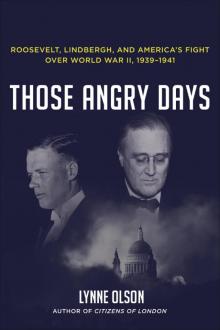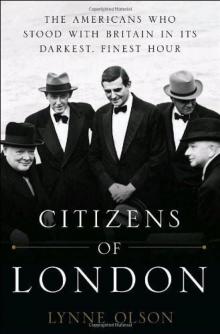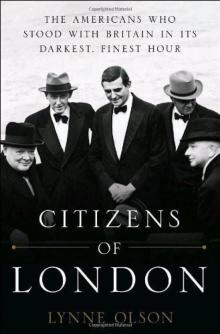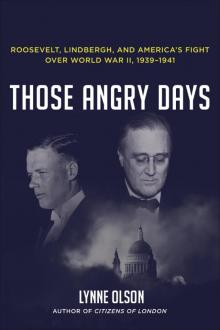- Home
- Lynne Olson
Madame Fourcade's Secret War Page 4
Madame Fourcade's Secret War Read online
Page 4
In Paris, a wave of panic enveloped the government and military. As Navarre and de Gaulle had forecast four years before on rue Vaneau, the vaunted French army was collapsing like the proverbial house of cards.
* * *
—
THREE WEEKS LATER, MARIE-MADELEINE Fourcade fled Paris, joining a mass exodus. With the Germans closing in on the capital, the French government had decamped six days before, sneaking out in the middle of the night without making any arrangements for the evacuation or defense of the city.
In keeping with its panicked residents’ funereal mood, Paris was shrouded in a thick, choking fog of smoke and soot from nearby oil and gas tanks that had been set alight by retreating troops. Soot covered the trees and streets, and some people noticed an eerie lack of birdsong as they left. Most of the birds, it turned out, had been killed by the black pall of smoke.
Overall, more than six million French citizens, resembling “an anthill that had been knocked over,” flooded south—the largest single movement of people in Europe since the Dark Ages. The scene was pure chaos, filled with “all the ugliness of panic, defeat, and demoralization” of a disintegrating society, remarked the American diplomat George Kennan, who witnessed the flight. Thousands of children became separated from their families, and for months afterward, anguished parents placed ads in newspapers trying to find their missing offspring. According to one refugee, “We had lost all points of reference. All our habits and all the rules of life were floating.”
Several weeks earlier, Marie-Madeleine had had the foresight to send her own children—ten-year-old Christian and eight-year-old Béatrice—to Noirmoutier, an island off France’s Atlantic coast, in the care of her mother. She had had advance warning from Navarre, who, before he left for the front, told her that the situation was hopeless and that when the time came for her to leave Paris, she should head for his country home in Oloron-Sainte-Marie, a village in southwestern France near the French-Spanish border. She followed his advice, setting off by car with her maid, her dog, and a married couple who were friends of hers.
For a day and a half, her Citroën inched slowly southward in an endless line of cars, wagons, trucks, taxis, delivery vans, and even pushcarts and hay wagons. Other refugees—pushing wheelbarrows and prams piled high with children and possessions—trudged along both sides of the road. An American journalist, caught up in the middle of the exodus, said it was like “a stream of lava flowing past, the unstoppable river which came from the unimaginable eruption somewhere in the north.”
Finally, Marie-Madeleine and her party reached Berry, a rural region in the Loire Valley, where she hoped to stay with a close friend, Aurore Sand—the granddaughter of the famed novelist George Sand. Sand’s house, however, was already filled with friends and relatives fleeing the Germans, so she handed over to Marie-Madeleine the keys to the historic Château de Nohant, her grandmother’s home.
At the château, which was more like a large country house than a castle, Sand had written many of her books and hosted some of the most important writers, painters, and composers of her time, including Balzac, Flaubert, Turgenev, Delacroix, and Liszt. Arguably her most noted guest was her lover, Frédéric Chopin, who lived off and on at Nohant for more than eight years.
After a meager supper that evening, Marie-Madeleine wandered through the château, finally sitting down at a piano in the salon. It was here, she knew, that Chopin had composed some of his masterpieces, including the Polonaise in A-flat Major, the Sonata Funèbre, two nocturnes, and four mazurkas.
That night, however, she identified most with another of Chopin’s works—his Étude op. 10, no. 12, otherwise known as the Revolutionary Étude. An exile from his native Poland, Chopin had written the etude to commemorate his countrymen’s celebrated—and failed—uprising against their Russian occupiers in 1831. Marie-Madeleine caressed the piano’s keys and then began to play, pouring her grief and rage over the impending fall of France into Chopin’s passionate, thundering piece. Afterward, she went to sleep in his bed.
She clung to her anger over the next several days as she and her companions continued their journey, traveling by night to avoid the Stuka dive bombers that strafed the refugee-crowded roads and sleeping by day in ditches, woods, and other places that were hidden from view. In one of the many small towns and villages through which they passed, she and her party were given shattering news: Marshal Pétain, who had just replaced Paul Reynaud as France’s prime minister, had ordered French troops to lay down their arms and had petitioned Nazi Germany for an armistice.
In a broadcast to his countrymen, the eighty-four-year-old Pétain attributed France’s defeat to “too few arms, too few allies,” and the country’s own moral failures, which included a lack of discipline and an unfortunate “spirit of pleasure.” At the same time, he expressed his compassion and concern for the millions of refugees still choking France’s roads and appealed to them and their compatriots to “rally to the government over which I preside during this difficult ordeal.”
As shocked as she was by Pétain’s capitulation, Fourcade was even more stunned by the joyful reaction of the people around her to the news. They laughed, kissed each other, and drank to Pétain’s health. Such happy scenes, which the novelist Arthur Koestler later described as “the apocalypse [disguised] as a family picnic,” were repeated throughout the country. As Fourcade saw it, the French, in their understandable relief that the war had ended for them, failed to recognize that in the process, they and their country had lost their souls.
On June 25, Pétain announced the terms of the armistice. German troops would occupy the northern three-fifths of the country, including Paris, the industrial north, and the Atlantic coast, with its valuable string of seaports. The remaining two-fifths, to be controlled by Pétain’s government and to be known as the free zone, would be made up of France’s southern provinces. The French also would retain control of French North Africa and the country’s other colonial possessions, as well as its fleet. The spa town of Vichy, in the center of France, was designated the new French capital.
Stopping for a few days in Saint-Jean-de-Luz, a lovely little seaside village on the Atlantic, Marie-Madeleine was invited to dinner by acquaintances there. They showed no interest in the stories she told them of what she had seen during her flight from Paris—abandoned toddlers crying for their parents, demoralized soldiers throwing down their arms and joining the exodus, refugees huddling in fear as German dive bombers appeared overhead. When she was finished, her acquaintances merely shrugged. It was time, they told her, to forget about such misfortunes and focus on the future and France’s return to normality.
Appalled by such complacency, Marie-Madeleine refused to heed their advice, launching into a long diatribe against what she saw as Pétain’s cowardice. Her hosts had had enough. “How dare you say this!” one of them snapped. “How dare you insult the name of the marshal!” Marie-Madeleine sat in silence for the rest of the meal. Never had she felt so alone.
In early July, she finally made it to Navarre’s country home in Oloron-Sainte-Marie. His family, however, had no idea where he was or what had happened to him. For more than a month, Marie-Madeleine stayed with them while awaiting news of his fate. Finally, word came that he was alive, although badly hurt in a battle near the Maginot Line. Late in August, he hobbled home, forty pounds lighter and in terrible pain from unhealed bullet wounds in his neck and back. Despite his grave injuries, he had escaped from the German hospital to which he had been taken and had made his way several hundred miles across occupied France, slipping into the free zone and back to Oloron-Sainte-Marie.
As he recuperated, Marie-Madeleine did her best to tamp down her impatience over her prolonged stay in this peaceful rural haven. Finally, she could contain herself no longer. She pointedly noted to Navarre that Charles de Gaulle, his longtime colleague and rival, was now in London. The most junior brigadier general in the Fren
ch army, de Gaulle had been appointed undersecretary of war just eight days before his dramatic escape to the British capital on June 17. He was the only French official willing to abandon his homeland to continue the fight against Hitler. From London, de Gaulle had made a BBC broadcast to France, urging his countrymen to join him in a movement to resist both the Vichy government and the Nazis. “Whatever happens,” he declared, “the flame of French resistance should not and will not be extinguished.”
Marie-Madeleine argued that they should follow de Gaulle to London and become part of his Free French operation. Her mentor rejected the idea outright. In England, he said, they would be refugees, just like de Gaulle, dependent on the British for everything. At that point, almost no one in the British government, with the prominent exception of Winston Churchill, took de Gaulle and his minuscule band of followers seriously.
Instead, Navarre said, he and Marie-Madeleine should remain in France and resist from within. The place to start, he said, was the country’s epicenter of defeatism—Vichy itself. He had many contacts there, he pointed out, thanks to his prewar political activities.
Marie-Madeleine’s heart sank. It was a phony capital, she told Navarre. What could they possibly accomplish there? He replied that in order to collect intelligence, they must go to its source—France’s current seat of government. Only there could they learn more about the country’s political and military situation.
Less than a week later, they were on their way to Vichy.
Looking more like an operetta stage set than the capital of a major European country, Vichy was as far removed from the chaos and fear afflicting much of the rest of France as one could possibly imagine. But that was exactly what the Pétain government wanted—a quiet, out-of-the-way place, with no smoke-belching factories, restive workers, or would-be resisters.
For more than two centuries, Vichy, famed for its reportedly health-restoring spring water, had attracted the well-to-do from all over Europe, who came there each year to take the cure. Along with its baths, Vichy boasted a casino, restaurants, tearooms, daily band concerts, and several Belle Époque hotels. When they arrived in early July, Pétain and his staff had taken over the Hotel du Parc, with its wrought-iron balconies and rooms awash in blue and pink toile de Jouy fabric depicting charming, restful pastoral scenes. While most ministries had been assigned offices in other hotels, the ministry of the interior, responsible for policing the free zone, was incongruously housed in the town’s sprawling Grand Casino, which boasted a Moorish cupola encased in gold tiles.
“Never was Vichy…as busy and as gay as in the summer of defeat in 1940,” noted the CBS correspondent David Schoenbrun. Wives and mistresses of government officials, in their best summer dresses, took daily strolls along the town’s tree-lined main avenue, opposite the beautiful Parc des Sources. There were endless queues in front of Vichy’s most fashionable restaurants, with the competition for tables particularly fierce at the dining room of the Hotel du Parc, where Pétain and leading members of the government held court.
The cheerful holiday atmosphere, however, was just a facade. Behind it, the government had embarked on a mission to kill parliamentary democracy in France and install an authoritarian regime modeled on that of Nazi Germany. On July 8, in the casino’s theater, the French parliament yielded to pressure and voted to turn over all its powers to Pétain and, by extension, to Pierre Laval, Pétain’s deputy and the power behind the throne. Henceforth, the legislature would assemble only at Pétain’s request. He in turn would govern at the sufferance of the Germans—and would continue to do so only as long as he did what they ordered.
After several conversations with Pétain and others in Vichy, William Bullitt, the U.S. ambassador to France, wrote to President Franklin Roosevelt that “the physical and moral defeat [of the French leaders] has been so absolute that they have accepted completely for France the fate of becoming a province of Nazi Germany. Moreover, in order that they may have as many companions in misery as possible, they hope that England will be rapidly and completely defeated by Germany.”
From its beginning, the Vichy government instituted policies of persecution and repression of French citizens, particularly Jews. In early July 1940, less than a month after France’s capitulation, Vichy began enforcing anti-Semitic measures in its territory without receiving orders from Berlin to do so.
Yet despite the growing oppression, Pétain and his government could do no wrong in the eyes of many if not most of the French, regardless of which part of the country they lived in. They saw Pétain as their savior, whose wisdom and firm direction would help heal the trauma of their country’s collapse. Shortly after the capitulation, Jean Guéhenno, an anti-German writer and literary critic in Paris, noted with disgust that the French radio “says ‘the Marshal’ in the same way it would say ‘my love.’ ” According to the French historian Henri Michel, “the Marshal’s authority was accepted by all with more than resignation. He offered consolation and hope.”
When Pétain had announced the armistice terms to the French people, he told them that a “new spirit of sacrifice” was needed. In order to recover from the anguish of defeat, he declared, France must undergo a complete transformation of its society, adhering to the conservative spirit of his government’s new motto—Travail, famille, patrie—rather than to France’s national motto since the French Revolution—Liberté, égalité, fraternité. Obedience to authority and devotion to work, he made clear, must replace the idea of freedom and equality. There must be a return to tradition, to working the land, and to so-called family values, which in his and Vichy’s eyes meant accepting men as the unquestioned authority figures of the family and viewing women solely through the prism of motherhood and caregiving.
Even before Pétain, France had treated women as second-class citizens, refusing them the right to vote, to own or control property without permission from male relatives, or to have a bank account in their own name. As was true in America and elsewhere, many in France were profoundly shocked by the emergence of large numbers of young women in the 1920s and 1930s who had made clear their contempt for conventional feminine behavior through their independent ways, which included bobbed hair, short skirts, dancing, drinking, smoking, getting jobs, and having premarital sex.
In patriarchal France, the behavior of the “new woman” was considered brazen and threatening, and the Vichy government struck back hard. Among other new restrictions, it decreed the death penalty for performing an abortion, made it much more difficult to get a divorce, barred married women from working in the public sector, and ordered all female students in high school to take classes in housekeeping.
Marie-Madeleine Fourcade, of course, embodied everything the new regime detested. She was separated from her husband, had a mind of her own and ambitions that stretched far beyond housekeeping, and had given up care of her children in order to take part in a nascent resistance campaign against the Germans. “She never operated according to society’s rules; she followed her own rules,” said a longtime acquaintance. “Basically, she acted like a man.”
Fourcade in turn was disgusted by Pétain’s government and everything it stood for, and she hated its seat of power from the start. To her, Vichy was nothing but a nest of gossip, infighting, and intrigue, filled, as she put it, with the “aristocracy of defeat”—politicians, businessmen, civil servants, military officers, and others—all seeking jobs or other personal or political gain from the new government.
Conspiracies were being hatched everywhere. The conspiratorial Navarre managed to convince Pétain that he had given up his rebellious ways and now fully supported his former boss’s policies. “The Marshal received me as if I was his son,” Navarre told an acquaintance. “He does not look touched by the cyclone. To see him, one would believe that the disaster that has befallen France was only a badly cooked meal.”
During their meeting, he persuaded Pétain to make him an offi
cial of the Légion Française des Combattants, a new national organization of military veterans created and funded by the government. Fourcade greeted the news with unconcealed exasperation. How would such a group fit into their plans for resistance? she asked. What exactly were they doing in Vichy, anyway? And what was her role supposed to be? Perhaps, she said, it would be better if she went to London after all.
Navarre tried to calm her down. “You know very well that I need you,” he said. He added that they were going to do what they had done in the late 1930s: create a network to provide intelligence about the German armed forces, only this time those based in France. The British, he noted, were in desperate need of such information to help them survive the German onslaught that they were about to face.
But, he said, he personally must be above suspicion. His League position would allow him to circulate throughout the free zone, making contacts, collecting information, and covertly drumming up political support for a future transformation of the League into an instrument of resistance. In the meantime, he said, pointing his cigarette at Fourcade, she would do the actual work of recruiting agents and setting up the initial intelligence operation.
She was stunned by his directive. How could she possibly do that? She was a woman, after all, barely thirty years old. Did he really believe military men like himself would accept her as a leader? He swept her objections aside, pointing out that as his deputy in the interwar years, she had amassed considerable experience in the handling of agents and other aspects of the labyrinthine world of collecting intelligence. And as for being a woman, he said, that in itself was an excellent reason for her to do it because no one would suspect her.

 Madame Fourcade's Secret War
Madame Fourcade's Secret War Last Hope Island
Last Hope Island Those Angry Days
Those Angry Days Citizens of London
Citizens of London Citizens of London: The Americans Who Stood With Britain in Its Darkest, Finest Hour
Citizens of London: The Americans Who Stood With Britain in Its Darkest, Finest Hour Those Angry Days: Roosevelt, Lindbergh, and America's Fight Over World War II, 1939-1941
Those Angry Days: Roosevelt, Lindbergh, and America's Fight Over World War II, 1939-1941